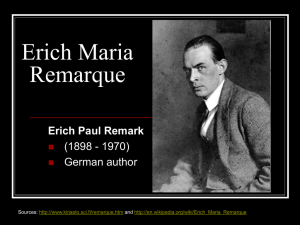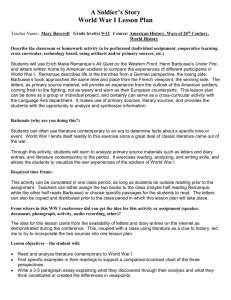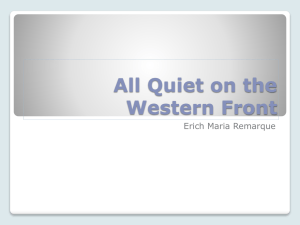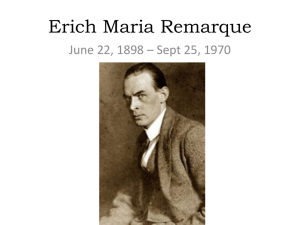All Quiet On The Western Front CARL ZUCKKMAYER
advertisement
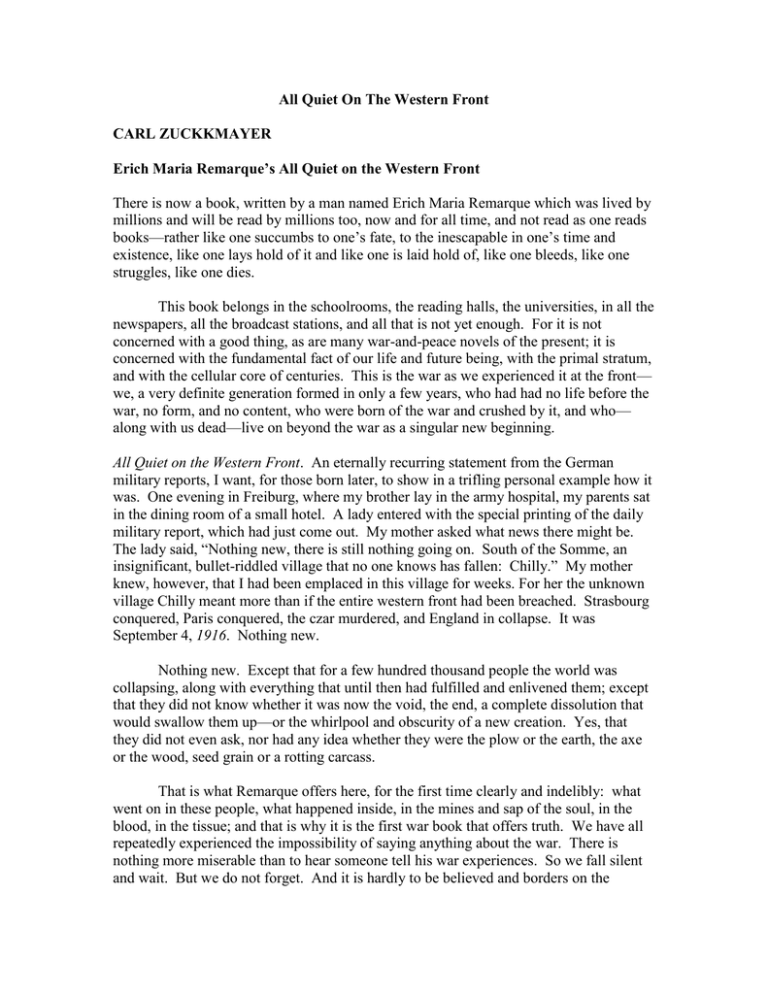
All Quiet On The Western Front CARL ZUCKKMAYER Erich Maria Remarque’s All Quiet on the Western Front There is now a book, written by a man named Erich Maria Remarque which was lived by millions and will be read by millions too, now and for all time, and not read as one reads books—rather like one succumbs to one’s fate, to the inescapable in one’s time and existence, like one lays hold of it and like one is laid hold of, like one bleeds, like one struggles, like one dies. This book belongs in the schoolrooms, the reading halls, the universities, in all the newspapers, all the broadcast stations, and all that is not yet enough. For it is not concerned with a good thing, as are many war-and-peace novels of the present; it is concerned with the fundamental fact of our life and future being, with the primal stratum, and with the cellular core of centuries. This is the war as we experienced it at the front— we, a very definite generation formed in only a few years, who had had no life before the war, no form, and no content, who were born of the war and crushed by it, and who— along with us dead—live on beyond the war as a singular new beginning. All Quiet on the Western Front. An eternally recurring statement from the German military reports, I want, for those born later, to show in a trifling personal example how it was. One evening in Freiburg, where my brother lay in the army hospital, my parents sat in the dining room of a small hotel. A lady entered with the special printing of the daily military report, which had just come out. My mother asked what news there might be. The lady said, “Nothing new, there is still nothing going on. South of the Somme, an insignificant, bullet-riddled village that no one knows has fallen: Chilly.” My mother knew, however, that I had been emplaced in this village for weeks. For her the unknown village Chilly meant more than if the entire western front had been breached. Strasbourg conquered, Paris conquered, the czar murdered, and England in collapse. It was September 4, 1916. Nothing new. Nothing new. Except that for a few hundred thousand people the world was collapsing, along with everything that until then had fulfilled and enlivened them; except that they did not know whether it was now the void, the end, a complete dissolution that would swallow them up—or the whirlpool and obscurity of a new creation. Yes, that they did not even ask, nor had any idea whether they were the plow or the earth, the axe or the wood, seed grain or a rotting carcass. That is what Remarque offers here, for the first time clearly and indelibly: what went on in these people, what happened inside, in the mines and sap of the soul, in the blood, in the tissue; and that is why it is the first war book that offers truth. We have all repeatedly experienced the impossibility of saying anything about the war. There is nothing more miserable than to hear someone tell his war experiences. So we fall silent and wait. But we do not forget. And it is hardly to be believed and borders on the miraculous that this book has already been written: one always thought two more decades would have to pass before someone could do it. Everything that has been created out of this time until now is patchwork by comparison. And there have already been a few war books that mean much to us: but they derive their momentary value and their present significance precisely from their misrepresentation, exaggeration, or distortion. The Fire by [Henri] Barbusse, the novellas by Leonhard Frank, they were so near, were created so much in the middle of it all that they could offer only flashes of light and shadows. And Leonhard Frank’s most mature and finest novella, Karl and Anna, entirely outgrows the war and enters the timelessly human. Then came books that reported and documented: Soldier Suhren and War by Ludwig Renn, 1902 by [Ernst] Glaeser. But here, from Remarque, fate itself has become the protagonist for the first time. The whole. That which was behind it, which burned beneath it—that which remained. And so written, so created, so lived that it becomes more than reality: truth, pure valid truth. The writer preceded the book with a statement “This book is intended to be neither indictment nor confession. It is intended only as an attempt to report on a generation that was destroyed by the war—even if they escaped the grenades.” The book fulfills this prefatory statement fully and completely. But it does still more. It draws everyone into the fate of this generation. It shows, without saying it in one word, how it lives, along with its dead, how it raises its head, gathers its scattered limbs, slowly, gropingly, unsteadily, stumbling, and how step by step, inexorably, unbreakably, it begins to march. How it retrieves its face from shadows, insane lights, fog, and masks, then retrieves its cheek, its will, which it will force upon the century. We are the ones who lives began with the knowledge of the ultimate and greatest things of earthly existence—of the most terrible, the mortal abandonment of man, and the highest, comradeship. QUESTIONS (Zuckmayer) 1. Why is this book so important? 2. Explain: The book is “intended to report on a generation that was destroyed by the war”—even if they escaped the grenades?
